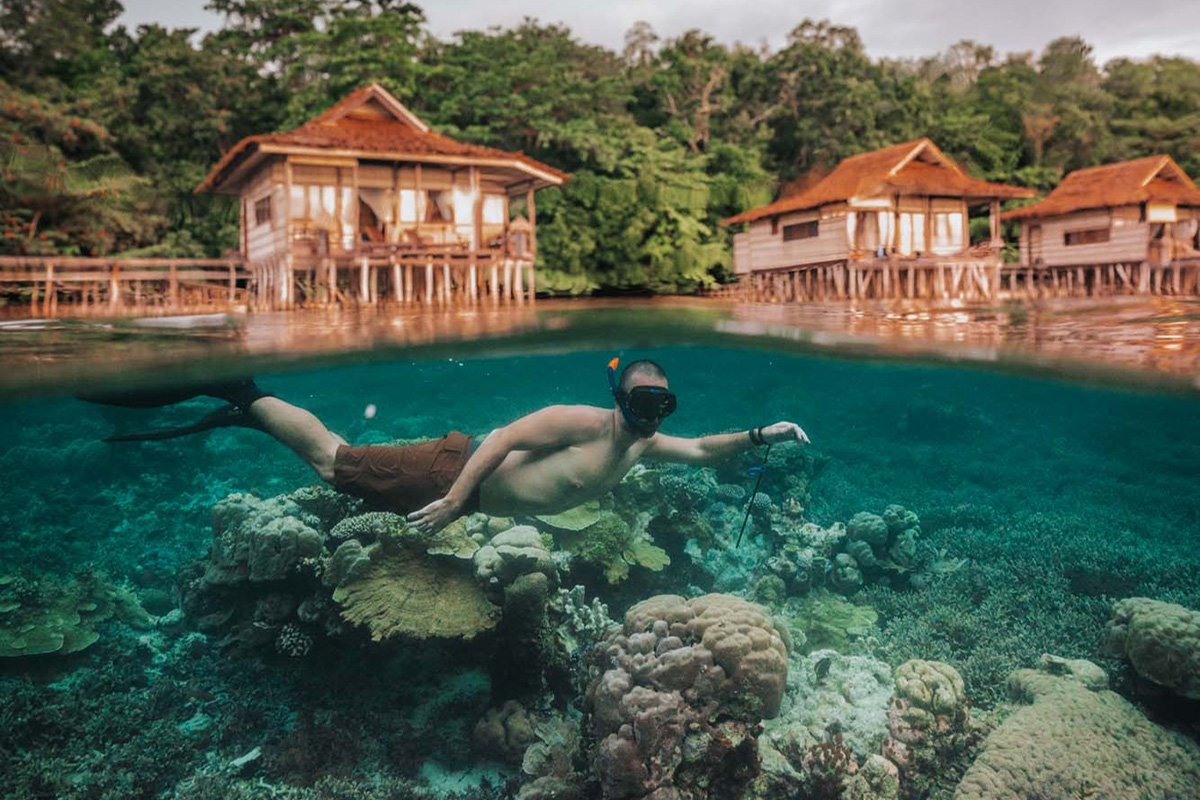Learn About the Critical Ecosystems of Raja Ampat – Coral Reef Workshop 28th-29th May 2025
Papua Paradise Eco Resort invites you to join an exclusive opportunity to learn from esteemed marine biologist Stephan Moldzio in a series of four 2-day workshops over two weeks. The fourth and final workshop, taking place on May 28th-29th, 2025, will be all about Raja Ampat’s critical ecosystems!
Week 4 of our coral reef workshop is an exciting one! These days will focus specifically on Raja Ampat. This means learning all about the ecosystems in the region and how they work together to support the myriad of species that live here.
The first day of the Raja Ampat workshop brings us to an exciting stage of discovery, where we immerse ourselves in the lesser-known, yet equally vital, ecosystems surrounding this region’s renowned coral reefs. The group will explore the seagrass beds and mangroves through two morning snorkeling trips.
Our first snorkeling session leads us through vast expanses of seagrass beds. Though these areas may seem relatively quiet compared to coral reefs, they are crucial habitats for numerous species. The beds play a major role in stabilizing the sea floor, preventing erosion, and providing shelter for juvenile fish. Some of the more exciting species you might encounter are sea cucumbers, pipefish, and various crustaceans camouflaged in the thick blades of grass. We will see how these organisms depend on the seagrass not only for food but also for protection from predators lurking nearby.
From the seagrass beds we will move on to the mangroves. This experience can be absolutely mesmerizing as the mangroves create a network of roots that extends into the water, providing shelter for countless species. We will see many juvenile reef fish hidden among the roots, which serve as natural barriers from the harsh ocean currents and potential predators.
The mangroves are also critical carbon sinks, absorbing and storing massive amounts of carbon dioxide, helping to mitigate the effects of climate change. Seeing these intertwined systems – seagrass, mangroves, and coral reefs – reinforces the understanding of how interconnected these environments truly are.
After returning to land, we will review our observations and discuss the complex relationships between the ecosystems. These discussions offer a profound insight into the delicate balance between these habitats and how they support the coral reefs’
On the second day of the workshop, we’ll venture out for another snorkeling session, this time around Birie Island, where we explore the continuous transition between seagrass beds, mangroves, and coral reefs. We’ll take samples and examine them under a stereomicroscope back at the resort. This is a chance to delve deeper into the hidden organisms that thrive in these habitats. This final day of exploration ends with a relaxing late afternoon dive and a final lecture focusing on environmental protection.
In this lecture we will discuss the importance of conservation efforts and how we, as individuals, can contribute to safeguarding these fragile ecosystems. Protecting mangroves and seagrass beds is critical not only for the species that depend on them but also for the broader global ecosystem. Their ability to sequester carbon, provide habitat, and sustain biodiversity makes them invaluable in the fight against climate change and habitat loss.
With mangroves disappearing at an alarming rate, losing 1-2% of their total area each year, it is critical to learn about why they are so important. This degradation threatens the biodiversity that depends on these ecosystems and poses significant risks to coastal communities that rely on them for storm protection.
Seagrass beds and mangroves are often overshadowed by the more vibrant coral reefs they are adjacent to, but these habitats are critical in their own right. Acting as nurseries, food sources, and coastal protection zones, they are essential to the health and resilience of the marine ecosystem. The snorkeling trips allow the group to experience firsthand the immense value of these environments, where life thrives hidden from our prying eyes.
This workshop highlights the importance of these overlooked ecosystems and serves as a powerful reminder of the need for continued efforts in marine conservation. Taking this knowledge away with you will enhance your diving and appreciation of marine environments.





